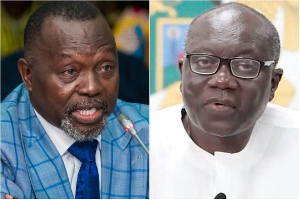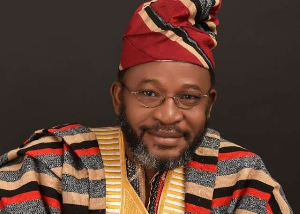“Come in Savannah, Savannah, are you there”? A senior journalist recounted his experience with telecommunications years ago when he had to use some archaic communication gadgets most generally termed as ‘Motorola’ to dictate news to his media house in Accra.
He said this during an engagement I had with media people in the Upper West region. He couldn’t hide his admiration for the new digital world which has made his professional and personal life so easy and productive.
A lot has happened in the Mobile Network space and it is amazing to think that it’s only two decades old. So how were we managing the situation before the advent of the mobile phones and it’s evolution to smart phones?
There are quite some successful businesses in the country currently. Some are big, some medium and others small or micro. The likes of UT Bank, Fidelity Bank, CDH Insurance, SIC, ELAC Group, Multimedia group are common reference points.
We are quick to either judge or commend them without even thinking about what it takes to set up a business, manage, grow and sustain it over time.
It takes the efficient use of resources-human, material and technological- to make a business profitable and sustainable. It also takes a lot of ingenuity.
So have ever thought about what it takes to be a Mobile Network Operator (MNO)? Can we imagine how the day in the life of a CEO of a telecoms provider is? In Ghana, it’s quite common to see everybody blaming mobile network operators for their commissions or omissions. Only a few appreciate what it takes to run a telecoms company.
First of all, their business impacts many lives and sectors. Telecommunications is transforming nations, industries and lifestyles. To become a mobile network operator or MNO, you would typically need to buy spectrum, deploy base stations and find a way of hooking those back to a core network.
Today you need more than just that. You have to invest in fiber network as well as other Internet Protocol equipment. Can you imagine what it takes to lay cable underground across the country? What about cable under sea. That is millions of dollars being sunk into the deep to bring fast internet and better voice services. MTN Group invested $100 million into the WACS undersea cable. Guess what, MTN was not the only investor. This is big.
The industry is very innovative and dynamic. Whilst some industries are leapfrogging, the telecoms industry is skyrocketing.
The operators have to spend money in research and innovation and into new businesses. The amount of investment one needs to keep pace with new trends and demands is “heavyweight.” Like a heavyweight boxer targeting his opponent, the mobile network operator run businesses as if they on a warpath. You must win the war if you are to survive. A bad decision can easily take you down and a misplaced priority can land you out of business. It is not for the fainthearted.
The industry, which has drastically changed from fixed to mobile GSM and within this short space of time the technology, has moved from GPRS, EDGE, to 2G to 3G, HSPA and now 4G. The world has started talking about 5G already. To be able to move from one generation of technology to the other you have to invest massively. For example, the NCA is currently auctioning its 4G license at a base of $67million. This is minus the amount of money the operator needs to invest in deploying the network. MTN has expressed its interest in the license because they know how it will richly impact their subscribers’ experience. This is no child’s play.
What makes the industry very capex intensive is that a new technology today will soon become an “archaic” technology tomorrow. Even before you start investing, the technology is threatening to become obsolete. Decisions must be timely. To be able to keep up with rapid innovations, MTN Ghana says it has invested $2.4 billion in its network since it acquired the business in 2006. This does not include other expenses like personnel, marketing and cost of sales, Customer care, office buildings etc. In addition to all these, one has to deal with Original Equipment Manufacturers (OEMs). Why? Because the quality of phones impact the quality of experience, simple.
The final thing I need to talk about is the multiple taxes you have to pay. These taxes include Corporate, VAT, NHIL, CST, National Fiscal Levy and several others. According to MTN Ghana, out of every one cedi recharge card that is sold, 34% instantly goes into taxes. MTN Ghana paid GHC605 million as taxes in 2014. There were other regulatory payments as well. If you have to invest this much you also definitely need to make profit and reinvest into future projects.
In spite of all this, the telcos argue that Ghana enjoys one of the lowest charges in Africa and that is verifiable. Inflation in communications has always been relatively low.
So, the next time you go bashing a MNO’s remember this- telecommunications play an increasingly important role in the world economy and the global telecommunications industry was about a $4.7 trillion sector in 2012.
The service revenue of the global telecommunications industry was estimated to be $1.5 trillion in 2010, representing 2.4% of the world’s gross domestic product.
In Ghana, the industry is said to contribute 2 percent of Ghana’s GDP.
Also note that the world’s most valuable brand is a telecoms company – Apple and in Africa the most valuable brand is MTN, Africa’s leading telecom provider. Globally, four of the top five brands in the world are ICT companies – Apple, Microsoft, Google, IBM.
We cannot underestimate the importance of mobile network operators. We have to support the industry if we value the impact it is making in our socio-economic growth. If it goes down, many businesses will go down with them.
So if there is one thing you need to do for telecoms companies, pray for their businesses to grow and work with them if you can.
Opinions of Wednesday, 25 November 2015
Columnist: Daily Guide














